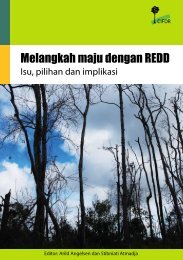Adaptive collaborative management of community forests in Asia ...
Adaptive collaborative management of community forests in Asia ...
Adaptive collaborative management of community forests in Asia ...
You also want an ePaper? Increase the reach of your titles
YUMPU automatically turns print PDFs into web optimized ePapers that Google loves.
152 • Eva Wollenberg, Ramses Iwan, Godw<strong>in</strong> Limberg, Moira Moeliono, Steve Rhee and Made Sudana<br />
and <strong>community</strong>-government dialogue and hope that this event and the<br />
improved facilitation skills will lead to further self-organis<strong>in</strong>g among<br />
<strong>community</strong> and district government members. One <strong>of</strong> the <strong>in</strong>dividuals is a<br />
villager who has been a member <strong>of</strong> the team s<strong>in</strong>ce the mapp<strong>in</strong>g exercises<br />
and has developed considerable facilitation and <strong>community</strong> organis<strong>in</strong>g<br />
skills. (We purposefully <strong>in</strong>cluded villagers at different stages <strong>of</strong> the project<br />
as staff to <strong>in</strong>crease local capacities.) Community meet<strong>in</strong>gs <strong>in</strong> some form<br />
will cont<strong>in</strong>ue <strong>in</strong> our absence because they happen anyway, through annual<br />
harvest festivals and annual meet<strong>in</strong>gs <strong>of</strong> certa<strong>in</strong> customary associations.<br />
Unfortunately, few Punan attend the harvest festivals, but they have<br />
had large, well-organised meet<strong>in</strong>gs <strong>in</strong> the name <strong>of</strong> the Punan Customary<br />
Community. We can expect that it will be difficult for local <strong>community</strong><br />
members to cont<strong>in</strong>ue to host meet<strong>in</strong>gs across all ethnic groups, especially<br />
given the trend towards <strong>in</strong>creas<strong>in</strong>g political organisation and divisions<br />
among these groups.<br />
Among communities and government, we promoted shared learn<strong>in</strong>g at<br />
a basic level <strong>of</strong> iterative shar<strong>in</strong>g and gather<strong>in</strong>g <strong>of</strong> <strong>in</strong>formation, not as an<br />
analytical exercise <strong>of</strong> cyclical self-improvement. We tried to promote more<br />
communication, jo<strong>in</strong>t learn<strong>in</strong>g and deliberation among communities as<br />
well as between communities and government, but we did not explicitly<br />
facilitate them <strong>in</strong> an adaptive process. We took this approach simply because<br />
it seemed more feasible to implement, given the complex relationships with<br />
which we were work<strong>in</strong>g. In addition to the activities <strong>of</strong> each cycle described<br />
above, this approach <strong>in</strong>cluded sett<strong>in</strong>g up <strong>in</strong>formation centers <strong>in</strong> villagers.<br />
The centers were abandoned after a couple <strong>of</strong> years because <strong>in</strong>formation<br />
was not more widely shared by the people manag<strong>in</strong>g them, which led to<br />
jealousies and tensions among villages. We now share <strong>in</strong>formation directly<br />
with each village.<br />
Our most successful efforts at <strong>in</strong>stitutionalisation, then, seem to be build<strong>in</strong>g<br />
capacity <strong>of</strong> <strong>in</strong>dividuals and work<strong>in</strong>g with like-m<strong>in</strong>ded agencies. In the spirit<br />
<strong>of</strong> work<strong>in</strong>g with spontaneous cooperation, we felt it would be unwise to<br />
<strong>in</strong>vest <strong>in</strong> more <strong>in</strong>tensive <strong>in</strong>stitutionalisation <strong>of</strong> an organisation or process<br />
(other than the annual <strong>community</strong> meet<strong>in</strong>gs) likely to be coopted and<br />
overridden by other <strong>in</strong>terests. We do not expect the meet<strong>in</strong>gs we have<br />
facilitated to be cont<strong>in</strong>ued <strong>in</strong> their current form, but we do expect that<br />
the types <strong>of</strong> relationships and activities that communities and government<br />
engage <strong>in</strong> will be affected. In this way we may have had a small impact on<br />
future <strong>collaborative</strong> learn<strong>in</strong>g. We should stress, however, that unlike the<br />
other projects descripted <strong>in</strong> this book, we have sought not to <strong>in</strong>stitute a
















